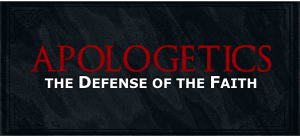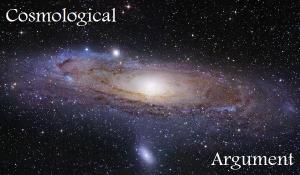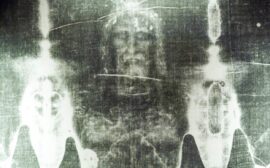Can God’s existence be proven? It determines on what one means by “prove.” If by proving, one means that one could scientifically pinpoint God’s existence; then the answer would be negative, since God exists beyond the scope of the material universe, thus making God untestable by scientific theory. If, however, by “proving,” one indicates that one could construct a body of evidence that logically points to God’s existence, much like what is termed “beyond reasonable doubt” in a court of law, then it can be affirmed that God’s existence can be proven. The art and science of offering proofs, or rather evidences, for the existence of God is a field termed apologetics. Apologetics is defined as “the discipline that deals with a rational defense of Christian faith. It comes from the Greek word apologia which means to give a reason or defense.”[1] Peter states that the Christian should “always be ready to give a defense to everyone who asks you a reason for the hope that is in you.”[2] However, some feel that the use of apologetics is not necessary. Others feel that the apologetic arguments given are weak and illogical.
Answering the Ontological Objections
In his book The Doctrine of God, Gerald Bray offers some objections to the apologetic arguments often posed. For the ontological argument “first developed by Anselm of Canterbury”[3] which argues that “God is the being than whom no greater being can be conceived;”[4] Bray argues that the term “greater” is unmeasurable.[5] He also argues that “the absolute cannot be measured except by itself.”[6] Yet, it would appear to this writer that Bray has not given the ontological argument enough credit. Anselm of Canterbury is arguing that God is the absolute standard of perfection. Knowing that one is imperfect implies knowledge of a perfect standard. For example: in gymnastics, competitors are judged by their execution of moves. The judges hold a standard of perfection by which they judge the competitors. The closer a competitor gets to the standard of perfection, the higher score the competitor receives. In fact, professors and teachers use a similar standard in grading papers. This standard is offered in a rubric which is given to each student. If the student completes his or her project according to this standard, a good grade is issued to the student by the professor. If the student fails to comply by the standards given in the rubric, then the student receive a bad grade. Anselm is providing a rubric of sorts. Anselm indicates that there is a perfect standard by which humans gauge morality, power, knowledge, and the like. Anselm then notes by the ontological argument that God fills the qualifications of that standard. Since a standard of perfection exists, it only stands to reason that God would exist to fill that standard. God is not necessarily gauged by Himself in the argument, at least in how this writer understands it. God’s necessary existence is essential in filling the standard. Yet since God exists according to those standards, then it could be stated that God is gauged by Himself since He alone is perfect. So while it ends that God is gauged by Himself, the point of the ontological argument seems to be that there is both a perfect standard and God alone can fill that standard.
Answering the Cosmological Objections
Bray also holds some issues with the cosmological argument, which was extremely surprising. Cosmological arguments contend that the existence of the universe speaks to the existence of a Creator. Bray examines Aquinas’ cosmological argument given in the Summa Theologicae. Bray asks if everything were to come from an uncaused cause, “how did it come into being?”[7] But, the point that drives cosmological arguments is that there must be an eternal stopping point. There cannot be an infinite regress of past events. Therefore, at some point something must hold the essence of infinitude. Either the eternal stopping point is a mindless, unconscious cosmos, or it is an intelligent, conscious Being of infinite power: a Being we know as God. Since inanimate things do not provide intellectual programs (one will not find rocks typing copies of Moby Dick), one must conclude that God exists. In fact, William Lane Craig’s kalam cosmological argument answers this objection by stating in the first premise that “Whatever begins to exist has a cause.”[8] Since God is understood to be eternal and uncaused, the kalam cosmological argument bypasses Bray’s objection. The point behind Aquinas’ and Craig’s cosmological arguments is that there must be some eternal explanation for our existence. Again, this existence is answered by either an eternal absolute nothingness (which is impossible since absolute nothingness cannot bring anything into existence), an eternal universe (which cannot be since there must be an absolute beginning because there cannot be an infinite regress of past physical events), or by an eternal, Conscious Being we know as God.
Answering the Teleological Objections
Lastly, Bray argued against the teleological argument, or an argument for God’s existence from design. Bray argues that “it is not clear that there really is a single design which can be applied to the entire universe.”[9] Yet, there need not be a unified design for the universe (yet I would argue that most of the designs of the universe exist to allow for the possibility of life). Any aspect of design indicates the presence of a designer. The words on this page indicate design as they are constructed to bring forth a particular point. Needless to say, one can rightly suggest that there must be an existence of a writer due to the construction of this writing. The same is demanded by the teleological argument. Any design in the universe demands the existence of a designer. Since the universe holds a multiplicity of designs, it must be that there exists an eternal Designer.
Conclusion
As it was mentioned earlier, it is scientifically impossible to prove or to deny God’s existence. However, evidence can be given to provide a compelling case for the existence of God. John S. Feinberg in his fantastic work No One Like Him: The Doctrine of God writes “None of the arguments alone provides a conclusive proof, but they are just the sort of evidences one would find helpful in making an overall cumulative case for God’s existence.”[10] Have people come to faith because of these evidences? Yes. In fact, it was due to the compelling case for God that this writer came back to a stronger faith and re-entered the ministry. In the end, these arguments work because of God’s revelation. Apologetic arguments could demonstrate the viability of God’s existence on their own merit. However, their ultimate success is so
und if God has revealed Himself to creation. The ultimate revelation of God came in Jesus Christ, “who, being in the form of God, did not consider it robbery to be equal with God, but made Himself of no reputation, taking the form of a bondservant, and coming in the likeness of men.”[11] It is important to train Christians in the realm of apologetics so that they can defend their faith in a post-modern, relativistic culture. The Christian faith is under assault. It is imperative that Christian leaders equip themselves with the ability to defend their faith and train others to do the same.
NOTE: This article was submitted by Pastor Brian to his respected university as an assignment. Students wishing to use the contents of this article must abide by the rules of proper documentation. Failure to do so may result in a charge of plagiarism.
Bibliography
All Scripture, unless otherwise noted, comes from the New King James Version. Nashville: Holman Bible Publishers, 1982.
Bray, Gerald. The Doctrine of God, Contours of Christian Theology. Downers Grove: InterVarsity, 1993.
Craig, William Lane. Reasonable Faith: Christian Truth and Apologetics, 3rd edition. Wheaton: Crossway, 2008.
Feinberg, John S. Feinberg. No One Like Him: The Doctrine of God. Wheaton: Crossway, 2001.
Geisler, Norman L. Baker Encyclopedia of Christian Apologetics, Baker Reference Library. Grand Rapids: Baker Books, 1999.
Copyright. Pastor Brian Chilton. 2014.
______________________________________________
Footnotes
[1] Norman L. Geisler, Baker Encyclopedia of Christian Apologetics, Baker Reference Library (Grand Rapids: Baker Books, 1999), 37.
[2] 1 Peter 3:15.
[3] Gerald Bray, The Doctrine of God, Contours of Christian Theology (Downers Grove: InterVarsity, 1993), 68.
[4] Ibid.
[5] Ibid.
[6] Ibid, 69.
[7] Ibid, 70.
[8] William Lane Craig, Reasonable Faith: Christian Truth and Apologetics, 3rd edition (Wheaton: Crossway, 2008), 111.
[9] Bray, 71.
[10] John S. Feinberg, No One Like Him: The Doctrine of God (Wheaton: Crossway, 2001), 204.
[11] Philippians 2:6-7.








